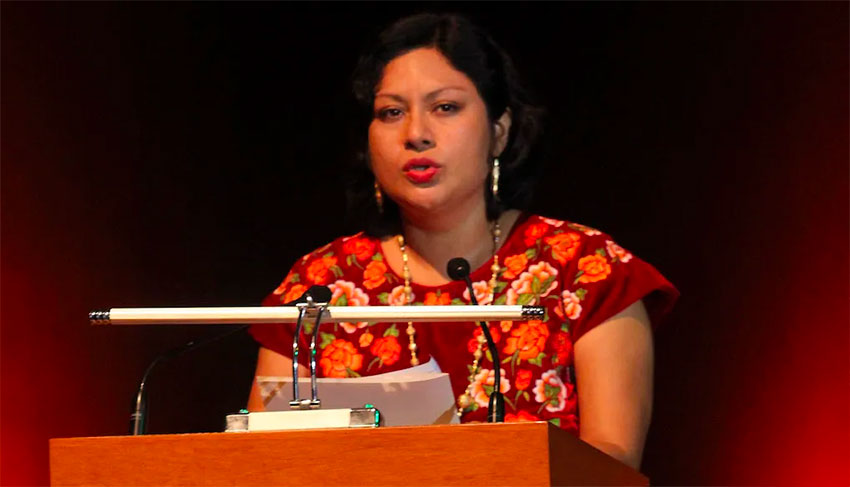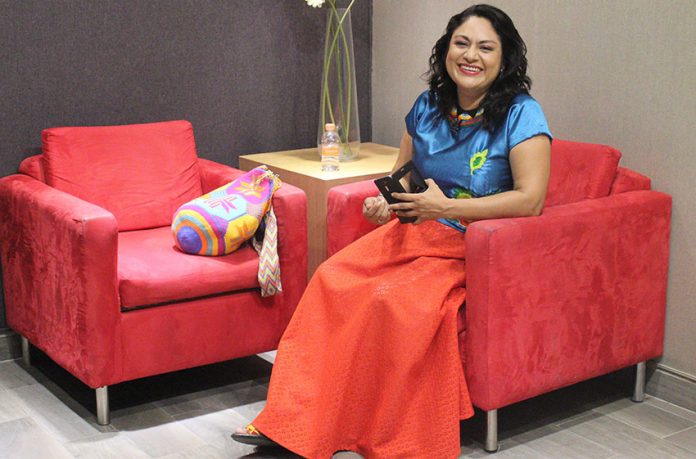Irma Pineda Santiago is taking the voice of Mexico’s indigenous people — and her own — to the United Nations.
On January 1, 2020, she began her term as a representative to the Permanent Forum on Indigenous Issues (UNPFII), one of four representatives from Latin America and the Caribbean.
Her personal and professional history have paved the way.
Pineda is a Zapotec (or Binnizá) born in Juchitán, Oaxaca, in 1974. Unfortunately, this Isthmus of Tehuantepec community has witnessed violence, even in its recent history. Pineda’s father disappeared unaccountably in 1978.
Despite the difficulties, Pineda earned both bachelor’s (communication) and master’s (education and cultural diversity) degrees to become a poet, essayist, translator (Zapotec/Spanish) and professor at the National Teachers University (UPN) in Ixtepec.
Her writing has appeared in various anthologies and other publications in Mexico and abroad and translated into English and other languages. She has published bilingual books of poetry such as Xilase Nisadó (Nostalgia for the Sea, 2006) and Doo yoo ne ga’ bia’ (From the house of the navel to the 9 rooms, 2009).
She creates and publishes her works in Diidxazá — literally, “language of the cloud people” — a Zapotec dialect of the isthmus, to make it more visible and appreciated. Bilingual versions of her writings feature her own translations into Spanish.
Her work as a writer and teacher naturally led to activism, particularly in the preservation of indigenous languages and cultural rights. For her, the emphasis on language allows her to tackle the rest.
“With the visibility of the language, we can bring to light other issues that concern our communities. For example, in my work, I talk about the violence against indigenous communities by the military, … the constant struggle of indigenous communities against mega-projects … (and) migration. Literature has enabled me to highlight these issues so they can now be discussed in forums such as the United Nations.”
Recognition as a writer, academic and activist granted her opportunities abroad, including residencies in Canada and the United States and academic presentations in the Americas and Europe.
She became the logical choice when it came time for Mexico’s Ministry of Foreign Affairs and the National Institute of Indigenous Peoples (INPI) to choose a representative to the UNPFII, even more so as the nominations were assigned during the International Year of Indigenous Language in 2019.

Pineda considers the post to be a “great honor, above all considering the fact that my work has been about the defense and promotion of the Zapotec language.”
She is one of 16 members of the UNPFII, whose preliminary meeting was held in Finland in February. Their first formal meeting will be in New York in April. In the meantime, forum members continue to coordinate online.
Pineda believes that it is important for international organizations and governments to pay attention to the knowledge and cosmovision of the original peoples of Latin America and the Caribbean. “We have a lot of work to build bridges between various indigenous organizations and governments.”
Mexico News Daily interviewed Pineda at the International Congress on Languages at Risk, where she drew out five main focuses for her term.
The first and foremost is the preservation and promotion of indigenous languages, not only to make them more visible to the world but also more attractive to native communities.
The second is the availability of education, especially to indigenous girls, as they are often pulled out of school early. But in addition to the national curriculum, she wants schooling that is adapted to the values and knowledge of indigenous communities.
The third is related to the environment on both the global and local levels. “When we look at indigenous communities or where they have more control over the land, they conserve the environment better. … If the land is being better cared for, it must mean that indigenous communities know how to do this. We need to learn from these indigenous communities.”
The fourth relates to the rights of women — that indigenous women know what those rights are and have the means to assert them.
The last is the right to consultation. This means that local, especially indigenous, communities have the right to approve or reject projects and other proposals that affect their lives and land.
When asked what foreigners living in Mexico can do to get to know and appreciate Mexico’s indigenous cultures and peoples, Pineda’s response was, “I think that one of the nicest ways … is through the arts — literature, music, textiles, graphic work. … It is a good door though which to start learning about the culture because you are starting from its beauty.”
Pineda does not deny that indigenous cultures have problems and conflicts but those can be contextualized through artistic expression.
Although she hasn’t been with the UNPFII long, she has already learned much, including that indigenous people in many parts of the world share the same concerns: particularly discrimination, language loss and educational issues.
Pineda still considers herself a writer first and foremost. “Poetry (and literature in general) has enabled me to bring the language to many people who had never heard an indigenous language before, … who didn’t even know that such languages existed.”
A sample of Pineda’s poetry in her native Zapotec can be heard here.
Mexico News Daily
